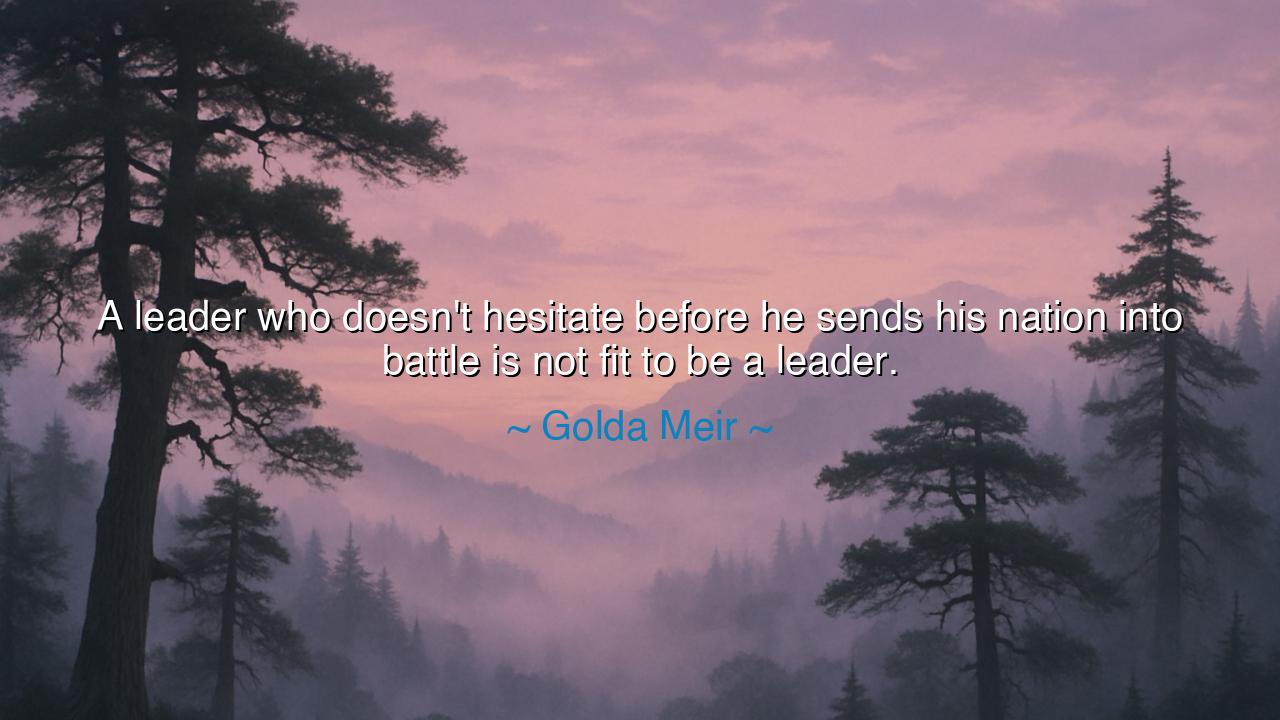
A leader who doesn't hesitate before he sends his nation into
A leader who doesn't hesitate before he sends his nation into battle is not fit to be a leader.






“A leader who doesn’t hesitate before he sends his nation into battle is not fit to be a leader.” Thus spoke Golda Meir, the Iron Lady of Israel, a woman of courage and compassion who led her people through times of trial and fire. In this single sentence lies the weight of ages—the eternal truth that leadership is not merely the exercise of power, but the stewardship of lives. To lead is not to act swiftly without thought, nor to revel in authority, but to feel the full burden of every decision that touches the fate of others. A leader who sends his people to war without a tremor of conscience is not a leader but a tyrant, for hesitation born of compassion is the mark of one who understands the sacred value of human life.
To hesitate before battle is not a sign of weakness; it is a sign of wisdom. The true leader does not thirst for conflict, nor glory in the clash of arms. He knows that behind every victory parade lie graves, and behind every trumpet of triumph echo the cries of widows and orphans. The wise leader measures war not in territory gained or power secured, but in lives sacrificed—and so he pauses, if only for a moment, to weigh the cost. That moment of hesitation is the soul’s acknowledgment of its sacred duty. Only after such reflection can the decision to fight be righteous, for it is tempered not by pride, but by conscience.
Golda Meir spoke these words as one who knew the price of war. Born in exile, hardened by struggle, and forged in the fires of Israel’s survival, she led a nation surrounded by enemies, forever balancing the need for defense with the yearning for peace. In 1973, during the Yom Kippur War, she faced the gravest choice of her life. The alarm of invasion sounded, and though the generals clamored for immediate response, she hesitated—not out of fear, but out of moral reflection. She knew that once unleashed, war could not be recalled. Her pause was not indecision, but reverence for the weight of what must be done. And though the war came, her hesitation revealed her humanity—a reminder that even in moments of necessity, the heart must not grow numb to the pain of its people.
Throughout history, the same truth has echoed in the hearts of the greatest leaders. Abraham Lincoln, before sending his armies into the fields of the American Civil War, wrestled with anguish over every casualty that would follow. He prayed for wisdom, sought counsel, and agonized over the fate of his divided nation. “I have been driven to my knees,” he once said, “by the overwhelming conviction that I had nowhere else to go.” Like Meir, his hesitation did not weaken his resolve—it deepened it. For when the moment came to act, his actions were guided not by arrogance, but by sorrowful necessity.
In contrast, history has also shown us the ruin brought by leaders who rush into battle without reflection. Kings and conquerors drunk on power have sent millions to their deaths, mistaking conquest for destiny and bloodshed for glory. Their haste is the symptom of vanity, not valor; their decisiveness is not courage, but cruelty in disguise. They mistake strength for speed and mistake hesitation for doubt, yet it is hesitation—humble, heartfelt, human—that separates the just leader from the despot. For the true warrior leads with both sword and soul, and his greatest weapon is not his might, but his conscience.
To hesitate before battle is to honor life. It is to remember that every soldier is a son, every fighter a father, every casualty a soul precious to someone. The leader who pauses sees not numbers, but names—not armies, but individuals. And in that seeing, he proves his worth. He may still send his nation to fight, but he does so not with joy, but with resolve, knowing the cost and bearing it upon his heart. Such a leader does not take pride in war’s beginning, but prays for its end.
Therefore, O seeker of wisdom, let this truth take root within you: whether you lead a nation, a family, or your own heart, do not act without compassion. Let hesitation be your teacher—not the hesitation of fear, but the hesitation of conscience. Before you judge, pause to understand; before you strike, pause to consider; before you act, pause to feel. For in that sacred pause lies the difference between recklessness and righteousness, between a ruler and a leader.
The lesson is clear: Power without empathy is tyranny; decisiveness without reflection is destruction. The true leader does not glory in command, but trembles under its weight. He acts boldly, but never blindly; he fights when he must, but mourns when he does. For as Golda Meir taught, “A leader who doesn’t hesitate before he sends his nation into battle is not fit to be a leader.” And in that single heartbeat of hesitation, humanity survives—even in the face of war.






AAdministratorAdministrator
Welcome, honored guests. Please leave a comment, we will respond soon